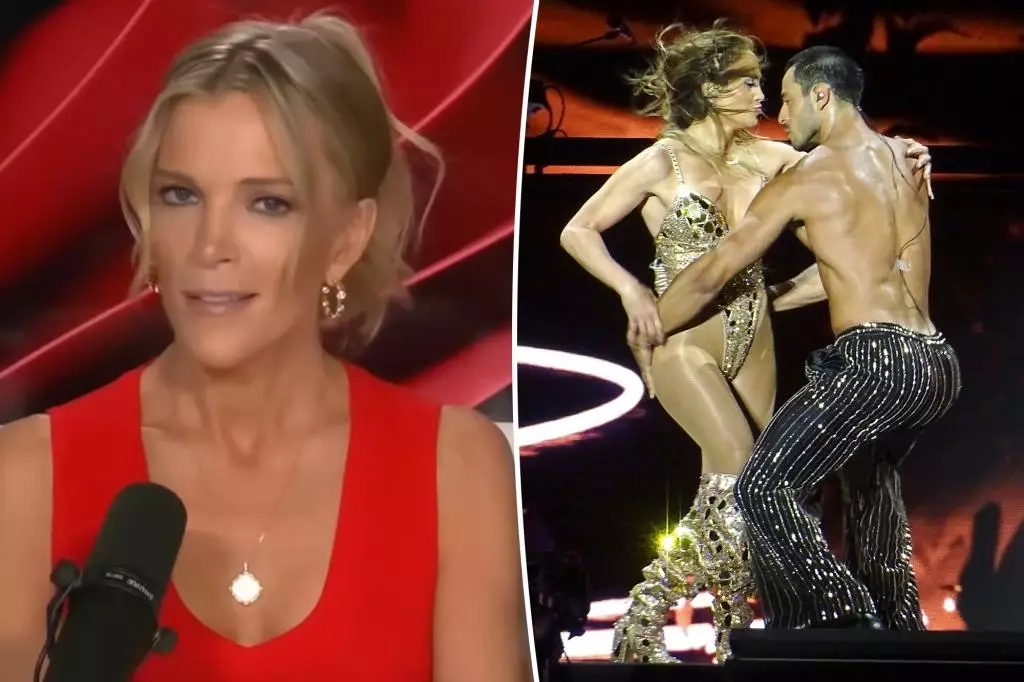In today’s media landscape, the line between personal opinion and public accountability often blurs, and figures like Megyn Kelly exemplify this tension. Her recent critique of Jennifer Lopez’s live performance demonstrates how public figures sometimes leverage their platforms to express unfiltered judgments, often igniting a firestorm of reactions. Kelly’s comparison of Lopez to a “soft porn star” reveals not only her personal biases but also a broader cultural debate about the boundaries of art, sexuality, and decency in celebrity displays.
What makes Kelly’s criticism particularly striking is its tone—it’s loaded with sarcasm and moral judgment, speaking more to her values than to the dance performance itself. This approach raises important questions: Is it fair to dismiss an artist’s performance based on personal comfort levels? Or does this reflect a persistent tendency among commentators to police female sexuality, especially when displayed confidently on stage? Kelly’s comments also highlight her tendency to present herself as a no-holds-barred critic, which can be both refreshing and problematic. While honesty is vital for journalism and commentary, it becomes questionable when it veers into shaming or objectification.
The Power Play of Social Media and Public Backlash
Kelly’s post sparked a divide that exemplifies the volatile nature of social media discourse. On one side are those who echo her disdain, perhaps appreciating her candor and aligning with her moral stance. On the other, many users saw her words as unnecessarily cruel and rooted in jealousy or superficial judgments. Responses defending Lopez often pointed to her physique and stage presence, emphasizing her confidence and artistry rather than her appearance. These reactions underscore how social media can amplify both praise and criticism, often transforming debates about art into personal attacks.
Furthermore, the controversy demonstrates how female performers are scrutinized more harshly than their male counterparts. Lopez’s bold stage moves, which some interpret as sensual or provocative, are often met with moral outrage or condescension. The cultural discomfort with female sexuality in performance persists, perpetuated by critics like Kelly who seem to conflate confidence with predation. It prompts reflection on whether criticism rooted in moral outrage is valid, or simply a manifestation of societal discomfort with women claiming agency over their bodies.
The Cultural Implications of Public Shaming
Kelly’s persistent penchant for outspoken critique extends beyond Lopez, revealing an attitude that often veers into public shaming of celebrities’ personal choices and appearances. Her comments on Sydney Sweeney and Lauren Sanchez display a similar tendency—reducing women to their physical features and questioning their motivations. Such commentary traffics in superficial judgments rather than substantive critique, often serving as a vessel for societal double standards about gender and sexuality.
This type of critique raises questions about accountability versus cruelty. Is it appropriate for media personalities to publicly denounce public figures in such a manner? Or does this reflect a tendency to commodify and sensationalize female bodies for engagement? The latter seems more accurate, highlighting an alarming trend of using sexuality as a battleground in celebrity culture—where empowerment is often misinterpreted as provocative behavior needing policing.
Kelly’s comments are more than just gossip—they are a reflection of ongoing cultural conflicts concerning sexuality, morality, and media responsibility. While free speech allows critics to voice their opinions, it also demands a certain level of self-awareness and respect for the complexity of individual choices. As consumers of media, it is worth questioning whether we endorse voices that shame or sensationalize, or if we instead champion conversations that recognize autonomy and celebrate diverse expressions of artistry. Criticism should challenge ideas, not demean individuals, and only through this balance can we foster a more respectful and honest cultural dialogue.

